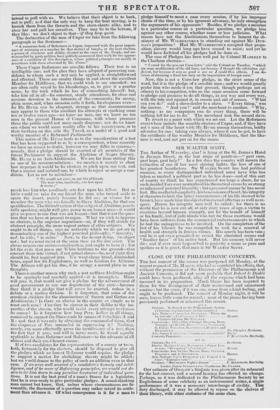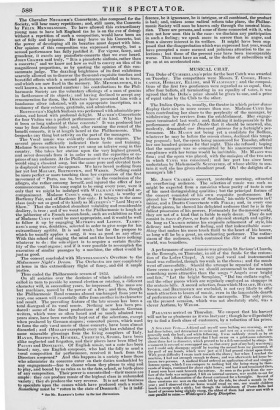CLOSE OF THE PHILHARMONIC CONCERTS.
THE last concert of the season was postponed till Monday, at the -urgent request of Mr. MASON, W110 had so regulated his affairs, that, without the permission of the Directors of the Philharmonic and Ancient Concerts, it did not seem probable that Robert le Diable could have been produced, after all the expense which had been incurred in its preparation. Much blame has been imputed to them for this derangement of their accustomed and announced routine; but the error, if it was one, arose from a kind feeling, and ought to be pardoned. The concert of Monday night, it will be seen, leaves little room for remark; most of the pieces having been previously performed or rehearsed this season.
Acr r.
Shill Alia. Dedirated to the Philharmonic Society.
(First time of performative in I hi, country.) pasiore. • Aria. Madame S I soy R P yVius NT, " Path), ma to, Irti tetu' It, Ce,11.1; 217 MO) Mozart.
Clarinet ohligato. Mr. WI 1.7.M A N.
Cotiest itt 11111 Clarinet. Bassoon, norm Trumpet, and 1), Bass —7,To,0rs. N■CUOLSON, G. Coon E. NA" I 1.1. MA s, MACKINTOS:1, ii ARPE1Z, and
DRAGONErCI The Chevalier Neultomm.
Aria, Signor TA mu r imbelle- Concerte, Pianoforte 21/endels.50htt BarthoidY. ACT II.
Sinfonia (No ) Beethoven. Duetto, Madame Cr NT DA 7,10 REAL' e Signor TA M- " Di caprice(" Rossini.
Coneertantc, four Messrs. Mott 1, SEYMOUR,
TOLREQUE, and A. (itt ESBACH Maurer. Aria, Madame I 71 ST L DA M (it' Concert a to Cour), " Entemlvz vons ?" Auber. Overture, "Midsummer Night's Dream" 1'. Mendelssohn Eartholdy.
Leader. Signor SeAallotErri—Cunductor, Mr. CRAMER.
Our estimate of ONsLow's Sintbnia was given after its rehearsal for the last concert, and a second- hearing has effected no change. Perhaps, as it was dedicated to the Philharmonic Society by an Englishman of some celebrity as an instrumental writer, a single performance of it was a necessary interchange of civility. This duty discharged, it may be allowed to repose on the shelves of their library, with other sinfonias of the same class. The Chevalier NEUKOMM'S Concertante, also composed for the Society, will bear many repetitions; and, still more, the Concerto by FELIX MENDELSSOHN. To have allowed this extraordinary young man to have left England (as he is on the eve of doing) without a repetition of such a composition, would have been an act of folly and injustice. He may leave us his Concerto, but the power of developing all its beauties must depart with him. Our opinion of this composition was expressed strongly, but a second performance has fully justified it. For vigour, fancy, and grandeur, it excels any pianoforte-concerto that we ever heard. JOHN CRAMER said truly, " It is a pianoforte sinfonia, rather than a concerto;" and we know not how so well to convey an idea of its magnificent proportions, as by quoting the opinion of this con- summate judge. The dazzling brightness of its first exhibition scarcely allowed us to discover the thousand exquisite touches and beautiful effects which a second performance enabled us to trace, and which are now fixed in the memory. Mr. MENDELSSOHN, it is well known, is a musical amateur : his contributions to the Phil- harmonic Society are the voluntary offerings of a man of genius in furtherance of its objects and having declined to accept any remuneration for them, the Directors have presented him with a handsome silver inkstand, with an appropriate inscription, as a testimony of their esteem, gratitude, and admiration. • BEETHOVEN'S Eighth Sinfonia was performed with admirable pre- cision, and heard with profound delight. MAURER'S Concertante for four Violins was a perfect performance of' its kind. Why has it been so long unheard at these concerts? It was produced last year by four Academy lads; and, after running the round of the benefit concerts, it is at length heard at the Philharmonic. This bespeaks any thing but activity on the part of the managers. The Vocal music was evidently chosen by the singers. The several pieces sufficiently indicated their . taste and training. Madame SCHROEDER has never yet sung an inferior song in this country. She takes her station upon the very highest ground, and never descends from it in order to suit the capacities or ca- prices of any audience. At the Philharmonic it was expected that she would sing a classical song, but the same pure and elevated taste is displayed wherever she appears. We have heard nothing from her yet but MOZART, BEETHOVEN, and WEBER. Nothing could be more perfect or more touching than her expression of the first movement of' " Parto, ma tu, ben mio :" in the conclusion of the allegro, she rather outsung herself, and injured the effect of her commencement. This song ought to be sung every year, were it only that we might be indulged with WILLMAN'S unrivalled ac- companiment. Madame Citsirt's song, as a song, is worthy of Bartlemy Fair, and of Bartlemy Fair only. It belongs to the same class (only not so good of its kind). as MIrazws s " Lord Mayor's Show." That she exhibited abundant volubility and considerable drollery, is true ; and if we went to the Philharmonic to laugh at -the jabbering of a French mountebank, such an exhibition as that of Madame CI NT1 IVOLlid be most appropriate, and it would be well to follow it up by engaging MATHEWS and LISTON. TAMBU- RINI'S song was, doubtless, selected in order to give scope for his extraordinary ac,ilita. It is sad trash ; but for the purpose to which he usually applies a song, it was as good as any other. With this school of singing the mind and the heart have nothing whatever to do : the sole object is to acquire a certain flexibi- lity of the vocal organs; and if it were possible to accomplish the execution of similar passages by a machine, the effect would be just as good. The concert concluded with MENDELSSOHN'S Overture to the Midsummer Night's Dream. The Orchestra are now completely at home in this extraordinary flight of fancy, and did it ample justice.
Thus ended the Philharmonic season of 1832.
On all societies over the destinies of which individuals are called in turn to preside by annual election or rotation, a different character will, in succeeding years, be impressed. The mass are but machines, moved by the power of a few; and thus, though the Philharmonic Band remains almost unchanged from year to year, one season will essentially differ from another in its character and result. The prevailing feature of the late season has been a total disregard of its vocal music. Nothing new has been pro- duced: some of the finest productions of the modern German writers, which were so often heard and so much admired two years since, have been carefully kept out of the selections, except when produced by German singers; concerted pieces, which used to form the only vocal music of these concerts, have been almost discarded ; and (MozsitT excepted) every night has exhibited the same miserable gleanings from the living compilers of Italy. HAYDN, BEETHOVEN, HUMMEL, CHERUBINI, SPOHR, have been alike neglected and forgotten, and their places have been filled by PAC INS and DONIZETTL Of English music, not a note has been heard; nay, one English composer, who had the folly to send a vocal composition for performance, received it back from the Directors unopened.* And this happens in a society where those who administer its concerns enter on their duties unshackled by any engagements—free to choose whom they please to sing and to play, and bound by no rules as to the date, school, or birth-place of any composition. Their power is uncontrolled—their means are ample: they can produce music of the highest class in unbounded variety ; they do produce the very reverse. It is not our business to speculate upon the causes which have produced such a result. Something must be "rotten in the state of Denmark :" be it indif- . • see sir. BABNITT'S Letter in the last ilarmonicoa.
ference, be it ignorance, be it intrigue, or all combined, the produet is bad; and, unless some radical reform take place, the Philhar- monic Society will soon be known only through the musical histo- rian. There are persons, and some of those connected with it, who care not how soon this is the case: we disclaim any participation in such a feeling; we speak more in sorrow than in anger, and from a sincere interest in its welfare. It might have been sup- posed that the disapprobation which was expressed last year, would have prompted a more earnest and judicious attention to the se- lections; but those of the present year have been incomparably worse. This must have an end, or the decline of subscribers will go on at an accelerated rate.




























 Previous page
Previous page